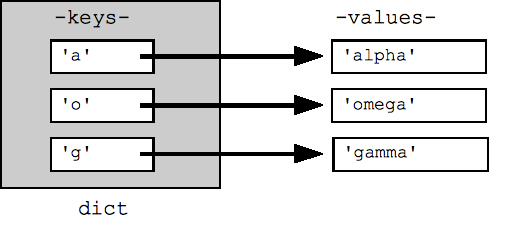Python Dict 词典的用法
2015-09-29 15:39
525 查看
Dict Hash Table
Python's efficient key/value hash table structure is called a "dict". The contents of a dict can be written as a series of key:value pairs within braces { }, e.g. dict = {key1:value1, key2:value2, ... }. The "empty dict" is just an empty pair of curly braces{}.
Looking up or setting a value in a dict uses square brackets, e.g. dict['foo'] looks up the value under the key 'foo'. Strings, numbers, and tuples work as keys, and any type can be a value. Other types may or may not work correctly as keys (strings and tuples
work cleanly since they are immutable). Looking up a value which is not in the dict throws a KeyError -- use "in" to check if the key is in the dict, or use dict.get(key) which returns the value or None if the key is not present (or get(key, not-found) allows
you to specify what value to return in the not-found case).
## Can build up a dict by starting with the the empty dict {}
## and storing key/value pairs into the dict like this:
## dict[key] = value-for-that-key
dict = {}
dict['a'] = 'alpha'
dict['g'] = 'gamma'
dict['o'] = 'omega'
print dict ## {'a': 'alpha', 'o': 'omega', 'g': 'gamma'}
print dict['a'] ## Simple lookup, returns 'alpha'
dict['a'] = 6 ## Put new key/value into dict
'a' in dict ## True
## print dict['z'] ## Throws KeyError
if 'z' in dict: print dict['z'] ## Avoid KeyError
print dict.get('z') ## None (instead of KeyError)

A for loop on a dictionary iterates over its keys by default. The keys will appear in an arbitrary order. The methods dict.keys() and dict.values() return lists of the keys or values explicitly. There's also an items() which returns a list of (key, value) tuples,
which is the most efficient way to examine all the key value data in the dictionary. All of these lists can be passed to the sorted() function.
## By default, iterating over a dict iterates over its keys.
## Note that the keys are in a random order.
for key in dict: print key
## prints a g o
## Exactly the same as above
for key in dict.keys(): print key
## Get the .keys() list:
print dict.keys() ## ['a', 'o', 'g']
## Likewise, there's a .values() list of values
print dict.values() ## ['alpha', 'omega', 'gamma']
## Common case -- loop over the keys in sorted order,
## accessing each key/value
for key in sorted(dict.keys()):
print key, dict[key]
## .items() is the dict expressed as (key, value) tuples
print dict.items() ## [('a', 'alpha'), ('o', 'omega'), ('g', 'gamma')]
## This loop syntax accesses the whole dict by looping
## over the .items() tuple list, accessing one (key, value)
## pair on each iteration.
for k, v in dict.items(): print k, '>', v
## a > alpha o > omega g > gamma
There are "iter" variants of these methods called iterkeys(), itervalues() and iteritems() which avoid the cost of constructing the whole list -- a performance win if the data is huge. However, I generally prefer the plain keys() and values() methods with their
sensible names. In Python 3000 revision, the need for the iterkeys() variants is going away.
Strategy note: from a performance point of view, the dictionary is one of your greatest tools, and you should use where you can as an easy way to organize data. For example, you might read a log file where each line begins with an ip address, and store the
data into a dict using the ip address as the key, and the list of lines where it appears as the value. Once you've read in the whole file, you can look up any ip address and instantly see its list of lines. The dictionary takes in scattered data and make it
into something coherent.
Dict Formatting
The % operator works conveniently to substitute values from a dict into a string by name:hash = {}
hash['word'] = 'garfield'
hash['count'] = 42
s = 'I want %(count)d copies of %(word)s' % hash # %d for int, %s for string
# 'I want 42 copies of garfield'
Google Python Class:
https://developers.google.com/edu/python/dict-files
相关文章推荐
- Python动态类型的学习---引用的理解
- Python3写爬虫(四)多线程实现数据爬取
- 垃圾邮件过滤器 python简单实现
- 下载并遍历 names.txt 文件,输出长度最长的回文人名。
- install and upgrade scrapy
- Scrapy的架构介绍
- Centos6 编译安装Python
- 使用Python生成Excel格式的图片
- 让Python文件也可以当bat文件运行
- [Python]推算数独
- Python中zip()函数用法举例
- Python中map()函数浅析
- Python将excel导入到mysql中
- Python在CAM软件Genesis2000中的应用
- 使用Shiboken为C++和Qt库创建Python绑定
- FREEBASIC 编译可被python调用的dll函数示例
- Python 七步捉虫法
